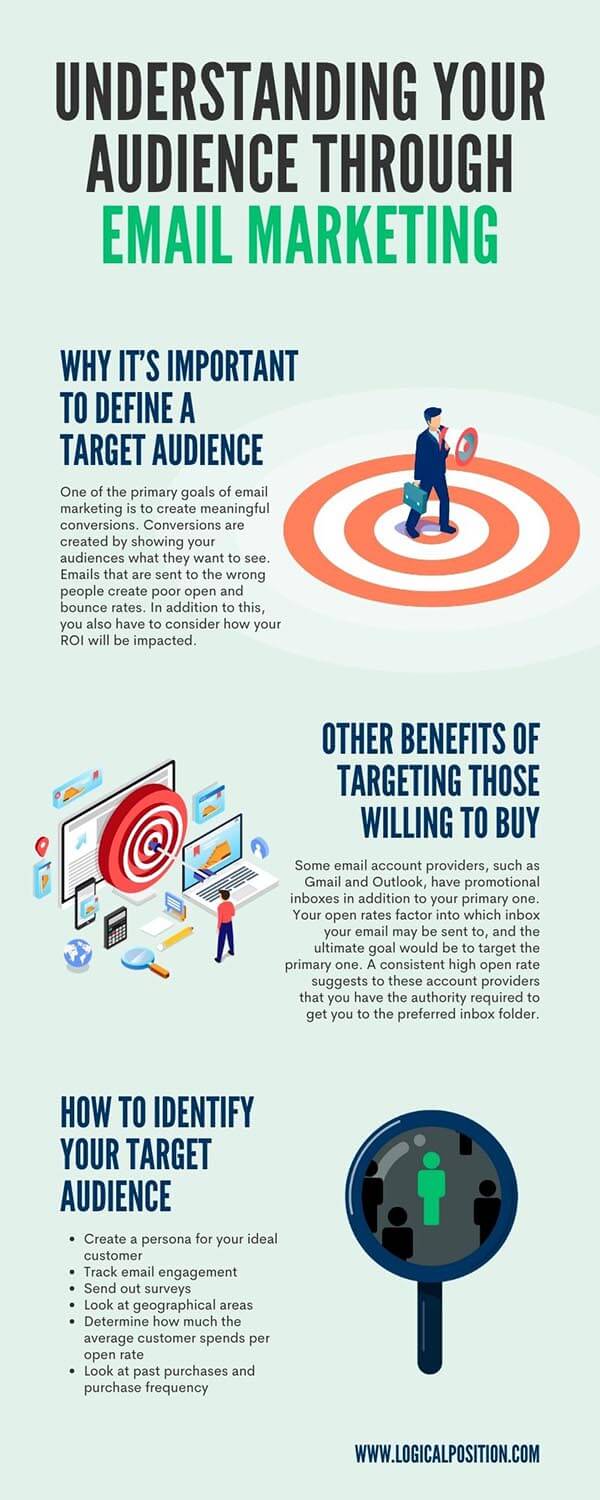What is a Target Audience?
Email marketing continues to be one of the strongest forms of digital advertising today. Businesses gain a higher return on income (ROI) through high-quality emails than through any other marketing channel. The reason for this is that email marketing is a personal experience, and it doesn’t require a search query to gain visibility and attract attention from a consumer. However, there are important things to know your audience in order to achieve the success that email marketing is known for.
It’s important for businesses using email marketing to understand that their goal shouldn’t be to simply send their emails to anyone and everyone they can. Even the highest quality emails aren’t going to appeal to every single consumer. Email marketing helps businesses by identifying not only who’s in the market for your overall industry, but also what specific product or service will attract a unique customer. In order to really know your audience and who you’re selling to, you’ll want to deconstruct your umbrella demographic and divide your audience into smaller groups.
When you track customer behaviors in order to determine who’s most likely to buy a specific product, your conversion rates are going to improve. If you’re new to email marketing or are already campaigning but looking to climb higher on the ladder and get to really know your audience, this is your go-to guide.
How To Find Your Target Audience
One of the primary goals of email marketing is to create meaningful conversions. As we’ve previously mentioned, showing your audiences what they want to see creates conversations. Emails that are sent to the wrong people create poor open and bounce rates. In addition to this, you also have to consider how your ROI will be impacted.
Email service providers, or ESPs, tend to charge according to the size of your contact list. Once you have a number of subscribers above your current contact number limit, you’ll have to pay more to send an email to the entire list. When you have the right audience, this investment is worth it.
Other Benefits of Targeting Those Willing to Buy
The correct audience doesn’t only determine your ROI, but also the inbox your email goes too. If your emails are consistently flagged as spam by subscribers, email account providers may send you a warning before eventually automatically directing all the emails you send out to the spam inbox alone.
Some email account providers, such as Gmail and Outlook, have promotional inboxes in addition to your primary one. Your open rates factor into which inbox your email may be sent to, and the ultimate goal would be to target the primary one. A consistent high open rate suggests to these account providers that you have the authority required to get you to the preferred inbox folder.
The Importance of Segmentations
Targeting an audience in an ESP comprises of dividing your current subscriber base into smaller segments that are grouped together according to specific criteria. Segmentations hold limitless capabilities and a business would be doing themselves a disservice to ignore utilizing them. Below are just a few of the reasons you’ll want to segment your audience, as well as what you may segment them by:
- Demographics: Demographics are essential in any marketing campaign, especially in email marketing and paid social. Consumers of different ages, income levels, and hobbies are naturally more inclined to buy different products.
- Industry: This is a subset of demographic, but in a different context. Some companies may have products that can still appeal to a wider age range, but this is not exactly the case when targeting a variety of industries are being targeted. One business may sell supplies for nurses, dentists, and chiropractors. All three of these professions are in the medical industry, but they use different tools. Blasting an email with dental supplies to your chiropractor clients won’t cause conversions and may even cause them to unsubscribe.
- Higher Engagement: As a natural result of having targeted audiences, you’ll ultimately earn a higher engagement rate. Your titles should reflect what’s inside your email, and the products promoted within them should be cohesive. It’s easier to put effective emails together when they’re going to a similar audience.
- Tracking Buying Habits: Your intended demographic for a specific product or service may remain static, but an effective campaign is one that grows and changes. Segmenting is valuable because it makes it easier to track customer’s actions. Smart marketers will use segmentations to not only send emails to the right people, but to also get a handle on who is most likely to convert based on an email’s content.
How to Identify Your Target Audience
We’ve examined the importance of a target audience, as well as how you can use the knowledge of the expectations of both you and your customers to attract conversions. You can’t effectively communicate with your audience, however, if you don’t know who they are. Determining your exact audience isn’t easy, and it takes time and expertise. There are several methods to get to know your audience, such as sending surveys, studying geographical market trends, and integrating your email marketing with your social media efforts.
On a base level, you may say that your audience is construction workers or PC gamers. As an expert on your business, you aren’t wrong, but email marketing is an incredibly personal experience. You want to get to know your audience better, like they’re a close friend—because if they feel as though you see them as an individual, they’ll ultimately feel like they know you as well. Additionally, you’ll learn more about your audience as you learn about their buying habits. The following are ways you can get to know your target audience:
- Create a persona for your ideal customer
- Track email engagement (Open and bounce rates, conversions, etc.)
- Send out surveys
- Look at geographical areas
- Determine how much the average customer spends per open rate
- Look at past purchases and purchase frequency

How Can We Help?
Logical Position has a team of experienced email marketing professionals dedicated to helping business owners build customer personas and segment lists accordingly. Plus, audiences and segmentations are only a small portion of the fully fleshed out services we’ll provide you. We work with our targeted email marketing services to create professional emails that build brand awareness and create meaningful relationships.
The relationship you build with your customers is the same relationship we want to build with you. We work closely with our customers to understand their unique needs and create a successful email marketing campaign. To learn more and get a free review of your account, contact us today.




